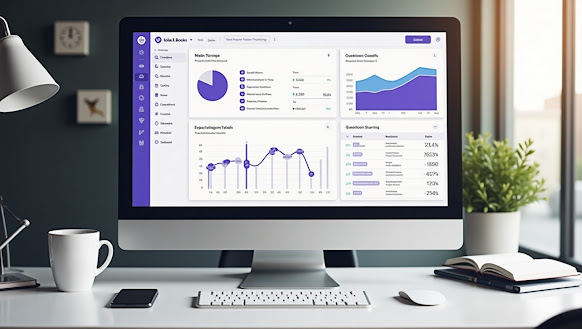How Real-Time Inventory Tracking Can Save Lakhs in Garment Manufacturing
Running a garment factory isn’t just
about designing cool clothes or catching the latest trends. It’s about managing
stock efficiently. Inventory mistakes can hit hard, costing Lakhs, delaying
orders, and frustrating customers. With the right tools, though, manufacturers
can turn things around. Real-time inventory tracking is now changing the game,
saving money and making processes smoother. This article breaks down how this
tech is transforming the apparel industry and why you should get on board.
Why
Inventory Management Is a Big Deal in Garment Manufacturing
Understanding
Inventory Costs and Their Impact
Ever wonder why some factories bleed
money? Excess stock, or stock that’s outdated, can pile up fast. They tie up
cash and take up space. On the other hand, running out of stock means missed
sales and unhappy customers. Industry reports show that almost 25% of
manufacturing costs go into holding inventory. Bad inventory decisions can be
the biggest drain on profit.
Common
Challenges in Traditional Inventory Management
Most factories still rely on manual
counting and paper logs. That’s slow and prone to mistakes. By the time errors
are caught, it’s often too late. Without instant data, managers make guesses.
This leads to overstocking or stockouts—both costly mistakes that can stall
production.
Benefits
of Streamlined Inventory Control
When inventory processes are tight,
cash flows better, and storage costs drop. Better tracking helps predict how
much stock is needed and when. This means orders go out on time and fewer
production halts happen. Clear, real-time data makes decision-making quicker
and smarter.
How
KOKA Real-Time Inventory Tracking Works in Garment Manufacturing
Technologies
Enabling Real-Time Tracking
Tools like RFID tags, IoT sensors,
and barcodes now make inventory visible at all times. RFID tags can instantly
share what’s in stock, while sensors monitor conditions and movement. ERP
systems and inventory software tie everything together, giving managers a clear
picture at a glance.
Integration
with Production and Supply Chain Processes
Real-time data bridges the gaps
between procurement, production, and shipping. When stock dips, automated
alerts tell staff to order more. If there’s a mismatch or theft, quick insights
are available. This smooth flow prevents delays and errors that cause extra
costs.
Data
Analytics and Insights
Quick data analysis helps predict
future demand and optimize stock levels. For example, if sales of a style drop,
the system suggests reducing inventory. If sales spike, more stock can be
prepared. Case studies show how factories using analytics cut waste and improve
profit margins.
Cost
Savings Achieved Through Real-Time Inventory Tracking
Cutting
Overstocks and Obsolete Inventory
Knowing exactly what’s in stock
prevents buying too much or holding onto outdated items. One big apparel brand
cut inventory costs by nearly 30% after switching to real-time tracking. Less
excess stock equals less money stuck in unsold items.
Avoiding
Stockouts and Growing Customer Satisfaction
Real-time alerts warn when stocks
run low, so replenishment happens before shortages hit. This keeps orders
moving without delay. Customers stay happy, and brands build loyalty because
they reliably deliver.
Lower
Warehouse and Storage Expenses
When inventory levels stay just
right, storage needs shrink. Less space means less rent and fewer employees
required to handle stock. Overall, warehouse costs drop, making the entire operation
more profitable.
Real-World
Success Stories in Garment Manufacturing
Case
Study 1: Accurate and RFID
Accurate adopted RFID tags to track
their inventory. The result? Faster stock checks, fewer errors, and a 20%
reduction in stock discrepancies. They also sped up order processing, saving
thousands every month.
Case
Study 2: Global Apparel and IoT Integration
This company combined IoT sensors
with KOKA ERP software. Inventory accuracy improved sharply, and they cut costs
related to excess stock and missing items. Their supply chain became more
reliable, boosting margins significantly.
Industry
Experts Speak Out
Many industry veterans say real-time
systems are a must for modern factories. These tools not only save money but
also make the whole process easier. Faster decision-making and fewer mistakes
are the biggest wins.
Practical
Tips for Garment Manufacturers
Picking
the Right Technology
Look for systems that scale easily,
work well with your existing setup, and are simple for staff to use.
Compatibility and ease of training are key. Don’t buy fancy tools that nobody
understands.
Training
Your Team
Change can be tough, but proper
training makes a difference. Show staff how new tech works and explain its
benefits. When everyone adopts it fully, results improve quickly.
Keep
Improving
Regular audits and system updates
are crucial. Technology advances fast, and your processes should too.
Constantly review performance and tweak systems to stay ahead.
Use
Data to Make Smarter Choices
Analyze trends and customer
preferences to decide what to stock. Data helps avoid overstocking slow-moving
items and ensures popular products are always available.
Conclusion
In today’s fast-paced garment
industry, real-time inventory tracking is no longer optional — it’s essential.
From reducing overhead costs and minimizing errors to enhancing production flow
and meeting delivery timelines, the advantages are undeniable. By embracing
technology that offers visibility and control across every stage, garment
manufacturers can boost efficiency and stay ahead of the competition.
If you're ready to streamline your
operations and gain a competitive edge, it’s time to invest in the right
solution.
KOKA Garment ERP
is built to empower manufacturers with real-time inventory tracking, order
management, and end-to-end production visibility.
📞 Schedule a free demo with our team today
🌐 Visit: www.kokatechnology.com
✉️ Email: info@kokatechnology.com
Koka Software Technology Pvt. Ltd. — Empowering Businesses Through Smart Software

.jpeg)
Comments
Post a Comment